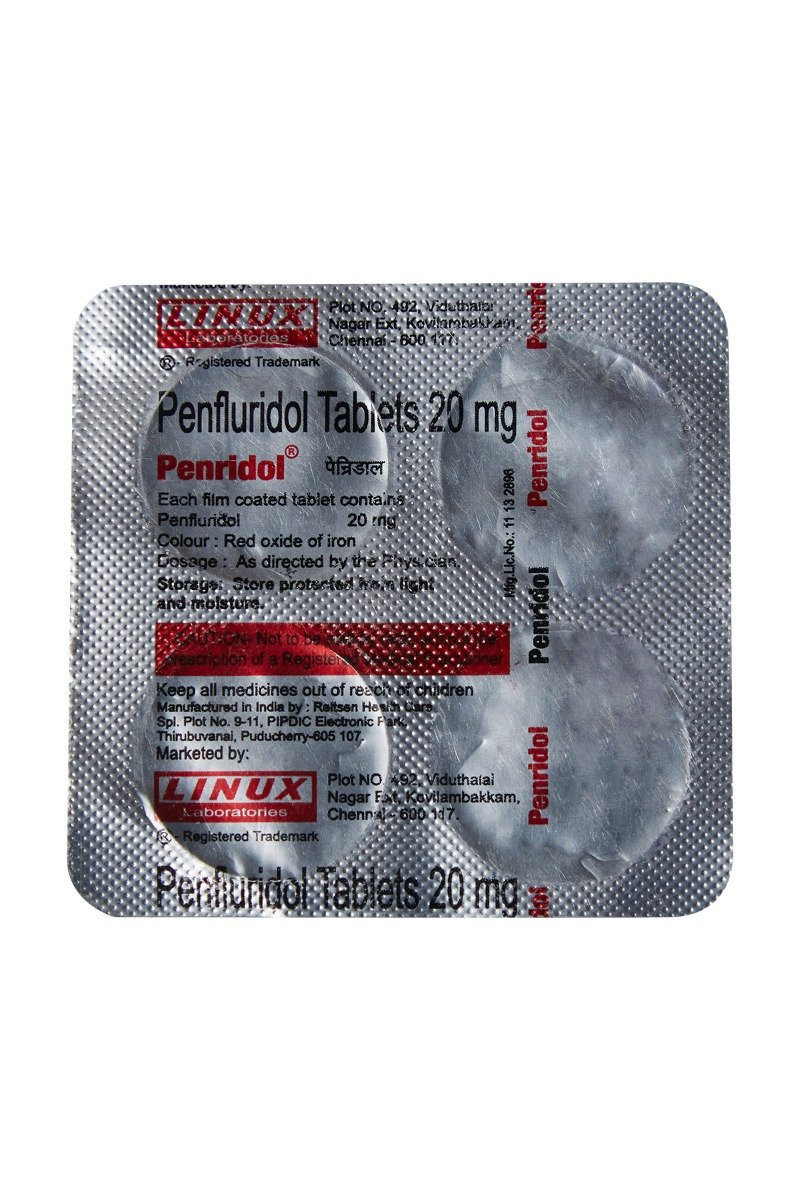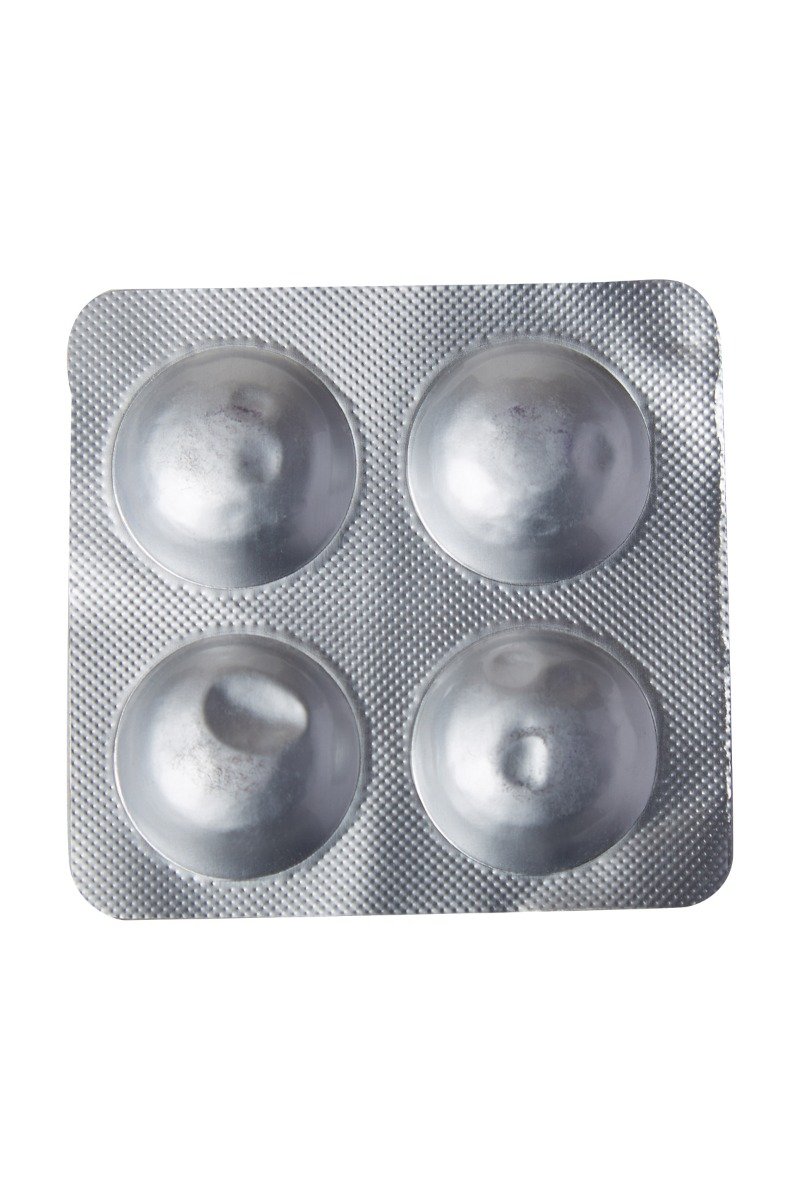PENRIDOL 20MG TABLET 4'S
MRP ₹160
(Inclusive of all Taxes)
₹24.0 Cashback (15%)
Provide Delivery Location
Online payment accepted
 Prescription drug
Prescription drugWhats That
Composition :
Manufacturer/Marketer :
Consume Type :
Expires on or after :
Return Policy :
About PENRIDOL 20MG TABLET
PENRIDOL 20MG TABLET belongs to a class of medications called antipsychotics indicated in the treatment of behavioural disorders such as psychosis and schizophrenia. Psychosis is a mental health condition in which emotions and thoughts are affected, and a person loses contact with reality.
PENRIDOL 20MG TABLET contains Penfluridol, which works by blocking the action of chemical messengers that affect mood and thoughts. Thereby, it helps treat behavioural disorders.
PENRIDOL 20MG TABLET may cause certain common side effects such as nausea, vomiting, headache, dizziness, and sleepiness. Most of these side effects may not require medical attention and gradually resolve over time. Take PENRIDOL 20MG TABLET as prescribed by your doctor.
Do not take PENRIDOL 20MG TABLET if you are pregnant or breastfeeding. Avoid driving or operating machinery, as PENRIDOL 20MG TABLET may cause sleepiness and dizziness. Keep your doctor informed about your complete health condition and medications to rule out any interactions or side effects.
Uses of PENRIDOL 20MG TABLET
Directions for Use
Key Benefits
PENRIDOL 20MG TABLET contains Penfluridol, which belongs to a class of medications called antipsychotics indicated in the treatment of behavioural disorders such as psychoses and schizophrenia. PENRIDOL 20MG TABLET works by blocking the action of chemical messengers that affect mood and thoughts. Thereby, it helps treat behavioural disorders.
Storage
- Report to Your Doctor: Inform your doctor about the muscle pain, as they may need to adjust your medication.
- Stretch Regularly: Gentle stretching can help relieve muscle pain and stiffness.
- Stay Hydrated: Adequate water intake supports muscle health by removing harmful substances and maintaining proper muscle function.
- Warm or Cold Compresses: Apply cold or warm compresses to the affected area to reduce pain and inflammation.
- Rest and Relaxation: Adequate rest helps alleviate muscle strain, while relaxation techniques like deep breathing and meditation can soothe muscle tightness, calm the mind, and promote relief from discomfort.
- Gentle Exercise: Participate in low-impact activities, such as yoga or short walks, to improve flexibility, reduce muscle tension, and alleviate discomfort.
- Consult a physician: If your symptoms don't improve or get worse, go to the doctor for help and guidance.
- Hydrate your body: Drink enough water to prevent dehydration and headaches.
- Calm Your Mind: Deep breathing and meditation can help you relax and relieve stress.
- Rest and Recharge: Sleep for 7-8 hours to reduce headache triggers.
- Take rest: lie down in a quiet, dark environment.
- Cold or warm compresses can help reduce tension.
- Stay Upright: Maintain good posture to keep symptoms from getting worse.
- To treat headaches naturally, try acupuncture or massage therapy.
- Over-the-counter pain relievers include acetaminophen and ibuprofen.
- Prescription Assistance: Speak with your doctor about more substantial drug alternatives.
- Severe Headaches: Seek emergency medical assistance for sudden, severe headaches.
- Frequent Headaches: If you get reoccurring headaches, consult your doctor.
- Headaches with Symptoms: Seek medical attention if your headaches include fever, disorientation, or weakness.
- Inform your doctor about dizziness symptoms. They may adjust your medication regimen or prescribe additional medications to manage symptoms.
- Follow your doctor's instructions for taking medication, and take it at the same time every day to minimize dizziness.
- When standing up, do so slowly and carefully to avoid sudden dizziness.
- Avoid making sudden movements, such as turning or bending quickly, which can exacerbate dizziness.
- Drink plenty of water throughout the day to stay hydrated and help alleviate dizziness symptoms.
- If you're feeling dizzy, sit or lie down and rest until the dizziness passes.
- Track when dizziness occurs and any factors that may trigger it, and share this information with your doctor to help manage symptoms.
- Contact your doctor immediately if you're experiencing a fast heart rate, palpitations, or other heart-related symptoms. This is crucial to determine whether the symptoms are related to your medication.
- Your doctor may need to adjust your medication regimen to alleviate the fast heart rate symptoms. This could involve changing the medication, reducing the dosage, or adding new medications to counteract the side effects.
- Follow your doctor's advice on monitoring your heart rate and blood pressure. This will help track any changes and ensure your heart rate returns normal.
- If you experience severe symptoms such as chest pain, dizziness, or shortness of breath, seek immediate medical attention. These symptoms can indicate a more serious condition that requires prompt treatment.
Drug Warnings
Do not take PENRIDOL 20MG TABLET if you are allergic to any of its components or if you have CNS depression or coma. Inform the doctor if you have or have had heart problems, epilepsy, thyroid problems, dementia, cerebrovascular problems, blood clotting disorders, hypokalaemia (low potassium), hypomagnesemia (low magnesium levels), or kidney/liver problems. Do not take PENRIDOL 20MG TABLET if you are pregnant or breastfeeding. Let the doctor know if you are taking any other medicines, including herbal products or supplements. PENRIDOL 20MG TABLET is not recommended for use in children as the safety and efficacy are not established. Avoid driving vehicles, operating machines and alcohol consumption, as it can increase sedation.
Drug-Drug Interactions
Drug-Drug Interactions
Login/Sign Up
Drug-Food Interactions
Drug-Food Interactions
Login/Sign Up
Diet & Lifestyle Advise
- Maintain a healthy diet and exercise regularly.
- Regularly attend therapy sessions.
- Perform meditation and yoga.
- Follow a regular sleep pattern.
- Avoid smoking and alcohol consumption.
- Learn about your condition, understand the risk factors and follow the doctor’s treatment plan.
Side Effects of PENRIDOL 20MG TABLET
- Drowsiness
- Sleepiness
- Headache
- Nausea
- Vomiting
- Change in weight
- Impotence
- Breast enlargement
- Tremors
Habit Forming
Therapeutic Class
All Substitutes & Brand Comparisons
RX
Out of StockUridol 20mg Tablet
Psycogen Captab
₹80
(₹7.2 per unit)
80% CHEAPERRX
Out of StockFlumap 20mg Tablet
Torrent Pharmaceuticals Ltd
₹89.9
(₹8.09 per unit)
77% CHEAPERRX
Out of StockMOPENDOL 20 TABLET
Mansur Pharma India Pvt Ltd
₹299.9
(₹26.99 per unit)
25% CHEAPER
Author Details
We provide you with authentic, trustworthy and relevant information
Drug-Diseases Interactions
Drug-Diseases Interactions
Login/Sign Up
FAQs
Drug-Drug Interactions Checker List
- LEVODOPA
- LITHIUM
- PHENYTOIN
- VALPROIC ACID
- MOXIFLOXACIN
Special Advise
- Your doctor may suggest an ECG or ECHO in order to check for any cardiac changes during the treatment period.
- Avoid drinking alcohol throughout the treatment period, as it can increase sedation and worsen the health condition.
- Use effective contraceptive pills during the treatment. If you become pregnant while taking the medicine, inform your doctor as soon as possible.
Disease/Condition Glossary
Psychoses: It is a severe mental health condition in which emotions and thoughts are affected, and a person loses contact with reality. Symptoms may include hallucinations, delusions, agitation, and talking incoherently.
Schizophrenia: It is a condition in which the person may see, hear, or feel things that are not there, believe things that are not true, or feel unusually suspicious or confused. Symptoms include hallucinations, delusions, thought disorders, movement disorders, disorganised thinking, loss of interest, lack of emotions, etc.

Have a query?
Alcohol
Safe if prescribed
Avoid alcohol consumption as it may increase sedation.
Pregnancy
Consult your doctor
PENRIDOL 20MG TABLET should not be used during pregnancy. Consult the doctor if you are pregnant, think you are pregnant, or if you are planning to become pregnant.
Breast Feeding
Consult your doctor
Breastfeeding is not recommended during treatment with PENRIDOL 20MG TABLET. Consult the doctor if you are breastfeeding.
Driving
Safe if prescribed
PENRIDOL 20MG TABLET may cause sleepiness and dizziness. Therefore, avoid driving or operating machinery.
Liver
Consult your doctor
Please consult your doctor if you have any concerns regarding the usage of PENRIDOL 20MG TABLET in people with liver problems.
Kidney
Consult your doctor
Please consult your doctor if you have any concerns regarding the usage of PENRIDOL 20MG TABLET in people with kidney problems.
Children
Safe if prescribed
PENRIDOL 20MG TABLET is not recommended for use in children as the safety and efficacy of this medicine are not established.










_0.jpg?tr=q-85)
.jpg?tr=q-85)
